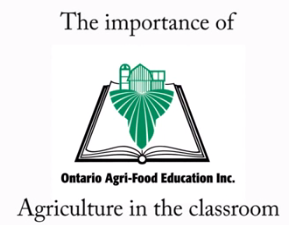Bringing Agriculture into Classrooms, OAFE’s Teacher Ambassador Program
Posted: October 2, 2014
Categories: Edible Education Network / Edible Education Project Profiles
 On a mission to build awareness and understanding of the importance of agriculture and food systems, Ontario Agri-Food Education Inc. (OAFE) was created in 1991 with baseline support coming from the Ontario Ministry of Agriculture, Food and Rural Affairs.
On a mission to build awareness and understanding of the importance of agriculture and food systems, Ontario Agri-Food Education Inc. (OAFE) was created in 1991 with baseline support coming from the Ontario Ministry of Agriculture, Food and Rural Affairs.
OAFE works to target the lack of consumer knowledge about food and farming systems by starting the knowledge process where it makes sense, by getting into schools. Dedicated to enhancing the learning experience for students, they aim to provide quality, objective and curriculum-linked agriculture and food-related learning materials, as well as professional consultative service directly to Ontario educators.
The Teacher Ambassador Program™ is one of their core programs, which helps them uniquely fulfill their mandate to promote agri-food resources, by getting those resources and lessons right in the classroom.
Selected Teacher Ambassadors receive training and support to deliver the OAFE programming directly in schools, designed for grades 7 through 12. Aligning with the Ontario curriculum, the program not only encourages students to think critically about agri-food related issues, it also exposes the students to the vast career opportunities in the sector.
One classroom teacher, Diane O’Shea P.H.Ec, shared: “teacher ambassadors perfectly support the new curriculum expectations in Food and Nutrition (Grades 9/10, Social Sciences and Humanities) particularly in having students look at the pros and cons of local food.”
OAFE Teacher Ambassadors are Ontario Certified Teachers with a passion for sharing information and promoting critical thinking about food, farming and agriculture. Through the delivery of lessons the Teacher Ambassadors gain classroom experience, as well as exposure to agri-food topics. One key goal of the program is to target new graduates who are not yet fully employed with a school board, so it’s an invaluable learning experience and opportunity not only for the students, but also the teachers.
There are currently 10 lesson topics to choose from:
- Local Food
- Food Security (Feeding 9 Billion)
- Food Safety
- Climate Change
- Environmental Initiatives
- Agriculture in Canada
- Conventional and Organic Agriculture
- Issues around Livestock Production
- Biotechnology
- Technology and Innovations
A plethora of important lessons are taken away, as one past student shared, “Agriculture feeds us, as well as our economy.”
As we expand on in the Q&A below, the large number of hard-working candidates, a growing interest in food-related topics, as well as industry support, have all worked together to make this program a great success.
Interested in getting Ag in your classrooms? Educators in grades 7-12 can request free lessons in their classes, which are all linked to the Ontario curriculum. For more information on how to book a free lesson delivered by OAFE Teacher Ambassadors, be sure to visit the OAFE website.
We spoke with Becky Parker, Project & Partnership Manager at OAFE, and asked her some questions about this inspiring, educational program. Check out the Q&A below for some insight into the program’s success.
OAFE Q&A
How is your program funded?
The Teacher Ambassador Program™ is a core program of OAFE and is funded through the foundational support of the Ontario Ministry of Agriculture Food and Rural Affairs. Additional funding for the program is provided through generous sponsorships by organizations and businesses within the agri-food sector.
How did you first engage with schools?
We use a series of outreach strategies to connect with individual educators, such as advertising in Professionally Speaking and attending numerous teacher conferences including OFSHEEA, OSCA, STAO and OPHEA. We also communicate with educators through our bi-monthly e-newsletter. OAFE is also engaging with school boards on a deeper level through targeted outreach.
Our best champions are classroom educators who have had an OAFE Teacher Ambassador in their classroom, loved the experience and encourage their colleagues to participate in the program.
What did you use to make your case for support?
When approaching new funders for the program we highlight the measurable impact Teacher Ambassadors have in the classroom. Statistics and qualitative data on student learning outcomes speak volumes to stakeholders.
What tips do you have for others doing this kind of initiative?
The OAFE Teacher Ambassador Program™ is a fairly unique program in its targeted use of newly graduated educators. However with any type of initiative that is using people to deliver a program, the key is structure. It is important that those who are delivering the program are aware of the specifics on content and delivery. As well, the marketing to the recipients needs to be clear about what the program encompasses.
Another key is to constantly measure impact. When data is collected it allows you to understand the impact your program is having and identify ways to constantly expand and improve.
What was one of the biggest challenges you’ve come up against and how did you address it?
One of the biggest challenges with this program is the fast turnover rate of Teacher Ambassadors. The individuals joining the program are usually looking for full-time employment and this is a great way for them to add to their portfolio as they continue that search. We are always happy for our Teacher Ambassadors when they get contract or Long-Term Occasional positions, even if they have only been with OAFE for a short time period.
In order to address this issue of turnover, we do two things. The first is to ensure that we have quick and efficient training programs. We have implemented an e-learning strategy which helps us to prepare the Teacher Ambassador to deliver lessons in the classroom. Secondly, we constantly advertise for and accept applications for Teacher Ambassadors. This allows us to expand our capacity for lesson delivery.
What factors were critical for your success?
1. Candidates: One of the factors critical to the success of this program is the high number of under-employed teachers looking for classroom experience. This gives us a large roster to draw on so that we can have high quality individuals delivering our lessons.
2. Interest in Food topics: The second factor is the popularity of agriculture and food topics in the mass media. As a result of this interest, teachers are often looking for ways to address topics like organic and conventional food within their classrooms. Many teachers are not comfortable with all the conflicting information, so the OAFE Teacher Ambassador Program™ is an excellent opportunity to have a trained educator come into the class to address the hot topics in agriculture.
3. Industry support: We have collaborated with a diverse group of agriculture stakeholders to make the Teacher Ambassador Program™ a success. Some have offered financial support, while others have offered in-kind services of time to help us validate our lessons. The support of these organizations allows us to have a vibrant program which is up-to date on the hot topics within the industry.
Testimonials
Encouraging (anonymous) comments we’ve received from teachers:
“It was a wonderful lesson/presentation. There was a lot of hands on tasks which was great for my students!”
“The students (and I) really enjoyed the program and now feel much more informed about the agri-food sector.”
Student comments and lessons learned:
“I learned that robotic equipment plays a big role in the agricultural industry. It helps produce and grow many foods that us humans need.”
“I learned how large the agriculture spectrum is. I thought that it just involved some sort of farm, however now I know how many careers involve some sort of agriculture, whether it is through processing, technology or insurance, all of these jobs have relations to agriculture.”
“I learned about the process that is needed to grow specific types of crops.”
“I learned that there are careers in food science in ag.”
Contact:
Becky Parker, M.Ed
Project & Partnership Manager
Ontario Agri-Food Education Inc., Milton, ON
Phone: 613-743-2716
Email: projects@oafe.org
This profile is part of a series of profiles for the Ontario Edible Education Network.
Be sure to check out more profiles from the Network here!

